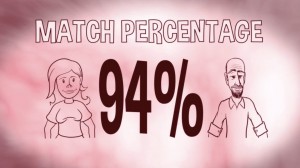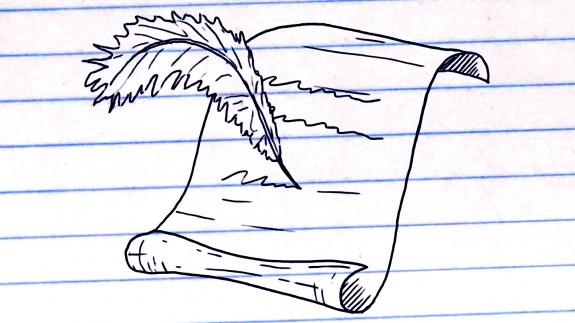
Be a better writer in 15 minutes: 4 TED-Ed lessons on grammar and word choice

There’s no denying it — the English language can be mighty tricky. When writing a paper, a novel or even an e-mail, you might look at a sentence you just wrote and think, “Is that comma supposed to be there?” or “Is that really the best word to use?” Fear not! TED-Ed has put together a list of four of our favorite grammar and language lessons to get your next piece of writing in tip-top shape.
First, let’s look at the often-confusing comma. It isn’t easy holding complex sentences together (just ask a conjunction or a subordinate), but the clever little comma can help lighten the load. How can you tell whether a comma is really needed? Terisa Folaron offers some tricks of the comma trade in this TED-Ed Lesson.
What about the Oxford comma? If you read “Bob, a DJ and a clown” on a guest list, are three people coming to the party or only one? That depends on whether you’re for or against the most hotly-contested punctuation mark of all time. When do we use one? Can it really be optional, or is there a universal rule? In this lesson, TED-Ed explores both sides of this comma conundrum.
Now, take an adjective such as “implacable” or a verb like “proliferate” or even another noun “crony,” and add a suffix, such as “-ity” or “-tion” or “-ism.” You’ve created a new noun. “Implacability,” “proliferation,” “cronyism.” Sounds impressive, right? Wrong! You’ve just unleashed a flesh-eating zombie. In this lesson, Helen Sword explains how few mistakes sour good writing like nominalizations, or, as she likes to call them, zombie nouns. Zombie nouns transform simple and straightforward prose into verbose and often confusing writing. Keep your nouns away from elongating nominalizations!
Finally, when it comes to good writing, don’t take the easy route! Instead, use this little trick to improve your writing: let go of the words “good” and “bad,” and push yourself to illustrate, elucidate and illuminate your world with language.
For more featured lessons on writing, grammar and linguistics, sign up for the TED-Ed weekly newsletter here >>




I agree with Helen Swords analysis of the subject.
I disagree.
I disa-disagree.
You all have a clear case of disagreeness.
Play nice rock and paper….
Your disagreenessism is disappointing.
There is too much disagreeativity in this thread.
We all should stop disaggreealyzing each other and get along.
I’m starting an antidisagreementarianism group, so that no one gets along.
Nominalizations aren’t the problem–bad writing is the problem.
Or nominalisations
Agree with you.
Couldn’t stop laughing after reading this though, “Bob, a DJ and a clown”. It shouldn’t be this funny.
Very interesting videos. Thanks for sharing!
Karen Neal,
http://www.grammerchecker.org/
Thanks for sharing this! Great tips for me
Is it available in Spanish? do you have a script translation to Spanish?
thanks.
Wait, what? None of this would apply in Spanish…
Maybe he is trying to learn English!
I’d argue on that. I don’t speak Spanish so I may be wrong, but I speak Romanian which is also a Latin language. Everything expressed in this blog post applies into Romanian as well.
Maybe some things…. Anyways, if you play the TED videos, do they give you any option for subtitles?
A great article and accompanying videos. Their enthusiasm for the color of language is inspiring and contagious.
Or infectious
got and get should go too.
Although I found these good I might not know when to apply them.
you clearly failed already
“good” – lol.
please dont find it good good is guilty
why wouldn’t an aspiring wrier know basic orthography?
Are these orthographic tenets more basic than the rules of capitalization and spelling? You’re so smug that you don’t even proof your own wriTing.
mice
interesting angle..
In German they have a saying ” Nette ist der kleine Schwester von Schiesse.” Which translates to ” Nice is the little sister of shit.”
There can not be anything less flattering than saying someone or something is ‘nice’.
Bad, good and nice. Could all be gone !
and ‘a lot’ . It doesn’t say a damn thing! :’)
Still a dyslexic nightmare… stupid commas.
Exactly what I was thinking.
Please do this for Dutch as well!
Great lesson. You are excellent teachers. I look forward to seeing you in action in other subjects
It’s a very interesting article and the videos help students a lot! Sometimes, we don’t know whether to put a comma or not in a sentence, so those tricks are great to take into account. They’re very useful when we write a long sentence or when we’re confused with linking words.
As regards nominalizations, I think that sometimes it’s very difficult to create a noun coming from an adjective, adverb or verb, mainly when the words are unknown. Whatsmore, it’s true that nominalizations make texts boring, vague, stressful and confusing when reading.
Finally, the video that talks about the adjectives Good and Bad help us a lot too. Students usually look for the easiest way to answer or describe things, without telling much or adding many details. In my opinion, we should improve our responses and writings by looking up new words, idioms and phrases in dictionaries. They help us to acquire new vocabulary and our writings to become richer.
Really nice and entertaining videos! The one that I like the most is the comma story, since I find it very useful to improve my writing skills.
Great, I really like the videos!!
Hi there!
I completely agree with Noelia! Sometimes students are strugguling with a sentence because, for some strange reason, it doesn’t give the meaning we want. And the problem is that we often forget about the clever comma!
The good and bad video is excellent too! A good video could deal with some techniques to avoid the use of “thing”. The language teacher hates that words in essays, but the thing is that sometimes the only word for “thing” is “thing”
Thanks for the videos!
These videos are superb! They’re highly useful and eye-catching! My favorite one is “the case against good and bad”. Perhaps we should also try to extract the word “interesting” from our vocabulary! Don’t you think?
I enjoyed the videos. they are good.
I totally agree with Mauro, these videos are awesome, a perfect combination between learning and animations,also great tools for language aquisition. They are catchy and creative, my favourite video is “Beware of nominalizations (AKA zombie nouns)”,trully a marvellous way of learning the language!!
Since when was the word “however” a subordinate conjunction. A conjunctive adverb,aka a transitional word, it is. If you can give me an example, I’ll stand corrected. If not, then your video needs to be corrected.
I think you are incorrect, it is a conjunction, however, I understand why you might think that.
I think you are incorrect, it is a conjunction, but, I understand why you might think that.
I think you are incorrect, it is a conjunction, although, I understand why you might think that.
However you think of it, “however” can be a subordinating conjunction or a conjunctive adverb.
Here are some insightful quotes I like… Lemme know if you like them:
“Imagination is more important than knowledge.
“I, at any rate, am convinced that He (God) does not throw dice.”
“The important matter isn’t to stop questioning; interest has its own reason for
existing.”
“Science without religion is lame, religion without science is
blind.”
“Two things are infinite: the universe and human stupidity;
and I am not sure about the universe.”
“Falling in love isn’t at all the most dumb thing that people
do — but gravitation cannot be held responsible for it.”
“The most beautiful experience we can have is the mysterious.
It’s the fundamental emotion that stands at the cradle of true art and
true science.”
“Anyone who has never made a mistake has never tried anything new.”
“Try not to become a man of success, but rather try to become a man of value”
The second video helped me a lot because in Spanish the comma rule is very hard and boring, I didn´t know this fight about the use of the comma specially before a conjunction.
Thank you for summarizing it all. It helps me alot. This is the first time i hear about Oxford comma LOL
It’s very interesting and attractive videos. Thank you for creating all of them, it helps me so much to understand grammar by fun learning.
I do find them interesting for improving my writing skills.
Oxford commas always clarify. If you choose to use them or lose them universally, you should use them.
And “towards” in nominalizations? Why not “toward”?
This vocabulary does not help ordinary people and it could. These videos are made by people who use words that ordinary people don’t use on a daily basis. They would be great videos if they did help people develop their vocabulary and kept it simply: nice and simple. Such as, instead of saying: turn the taps off; one could say, kindly turn the taps off.
Make a difference to our world if you have the time to think about it.
You could also say “Please turn the tap off”, without acting superior with your “kindly” nominalization.
Fyi … “hotly contested” should not have a hyphen. Compound adjectives with an -ly don’t get a hyphen. Where are your copy editors, Ted???
Is it just me or did the video about ‘good’ and ‘bad’ use a lot of nominalizations?
Personally, I feel nominalizations make a sentence sound more credible, especially if you’re making stuff up.
It’s always good to have a reminder We all get a bit caught up in texting and emailing, and it’s easy to forget some of the rules that make your writing clear and concise. Great videos!
We all get a bit caught up in texting and emailing, and it’s easy to forget some of the rules that make your writing clear and concise. Great videos!
One very important lesson is to not agonise over word choice. Sometimes you can get so hung up on finding a different word for “said” that your entire piece grinds to a halt.
Having said that, always look out for duplicate words. If you use the same key word in two sentences running it can jar with a reader. Reading out loud will identify these for you.
Same problem with repeated sentence construction – unless you are writing poetry of course!
http://cchogan.com/interview-with-myself/
“How Dare They?” should have an exclamation point and not a question mark.
How much time is wasted by well intended people correcting others. When the point is understood. Just take the point and leave the teaching to..well, teachers. How much time is wasted? Y waste your time and mine when you understand the point?
thanks for this nice post
G̶o̶o̶d̶
Excellent.
“Good Morning”
What I’m supposed to say?
nice
One of my main concerns when writing on the web these days is to take into account the large numbers of non native English speakers and readers who will be reading what I write. I won’t simplify my writing for that purpose, though it is always a consideration.
As non-English native speaker, I find these lessons quite helpful. But I think the writers / teachers / whoever post / made this should warned the readers / audience that these lessons are those with advanced English understanding. As someone with IELTS 7.5, I found the speakers in the video sometimes speak too fast or use some difficult vocabularies. Eventhough the video is entertaining and somewhat funny, the analogy or advanced vocabularies used in the video make it harder to grasp by people whose English is not in advanced level like me.
But thanks for this! It really give me new insights!
The best part of this entire post is the comments.
I wasn’t very impressed with the videos, but the comments have had me laughing all the way down the page. Quite entertaining.
yes please to firing got and get – especially the ‘have gots’:
i’ve got a dog –
what’s wrong with ‘i have a dog’?
i’ve got to go now – whatever happened to ‘i must go’?
all that aside – these videos are very clever and well made – i’m sure my children will be as entertained as i was, making learning easy… great to see brilliant teaching. thanks -
and please may i just say: must’ve, would’ve
really?
these are in my children’s (?) english exercise books … am i alone in thinking it’s an abuse of the apostrophe?
The English Lagrange is the hardest thing to understand and know where to put the right grammar, and how to speak proper.
I have been laughing at all these comments. Some were very interesting ,to me. So of the speakers were going to fast.
In my opinion, punctuation marks play a very important role in giving meaning to the language. A wrong placement of mark of punctuation can change the meaning of the sentence completely and sometimes even convert the sentence to complete nonsense. Punctuation is one of the most important aspects of written English. However, in most of the cases, it is left aside.
In my opinion, for stating a clear message, nobody should ever hesitate when using a serial comma.
Nevertheless, these videos are incredibly useful for teaching English grammar; moreover, they are also helpful for understanding your mother tongue grammar.